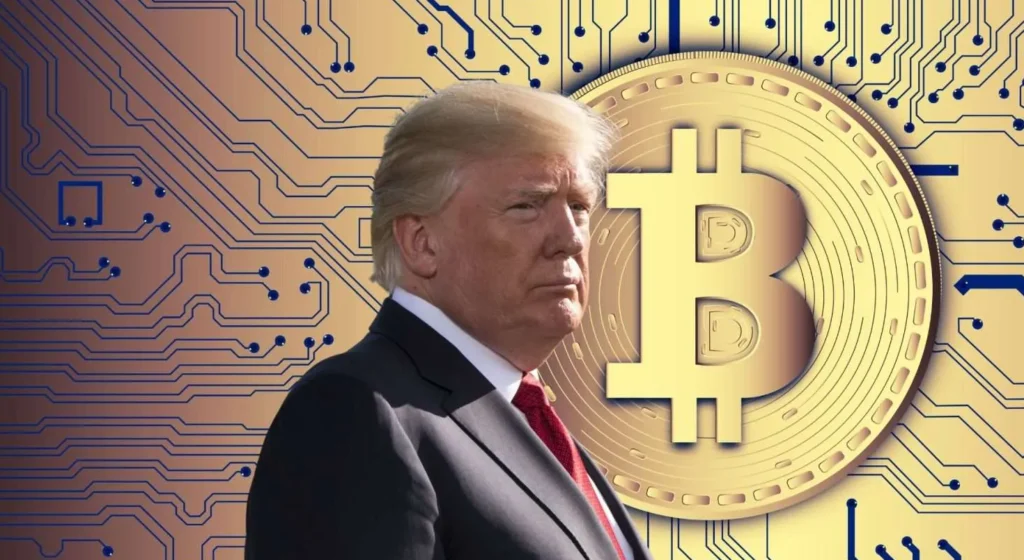The recent efforts by Trump’s crypto deregulation to deregulate the Bitcoin sector have drawn significant criticism from financial analysts, legislators, and ethics watchdogs. Critics argue that the Trump family’s increasing involvement and influence in the crypto sphere, which coincides with the policy change, poses a significant economic risk and challenges.
Trump’s Crypto Power Play
Following his comeback to the presidency, Trump’s crypto deregulation government has aggressively sought to destroy or postpone multiple cryptocurrency-related rules. These strategies include stopping previously Department of Justice (DOJ)-led enforcement activities, weakening Securities and Exchange Commission (SEC) monitoring, and dissolving some divisions concentrated on digital financial crime.

Concurrently, Trump family members—especially Eric Trump and Donald Trump Jr.—have started a sizable crypto business known as World Liberty Financial. Claiming to be supported by gold reserves, the corporation just unveiled a new stablecoin called USD1 and wants to become a pillar of a “new American financial future.” Trump Jr. called the effort “taking back control from globalist banking cartels.”
Public concern revolves mainly around this junction of policy and profit. Given the family’s expanding financial interests, the Trump administration’s strong pro-crypto stance raises questions about whether it is using its public position for personal gain.
Ethics Under Fire
Groups on government ethics have reacted fast. Calling the situation “conflict of interest 101,” Ishan Mehta, director of media and democracy at Common Cause, cautioned that the U.S. is headed down a perilous road because private financial gain seems to influence regulatory choices.
“Supporting innovation is one thing,” Mehta remarked. “It’s another thing to gut-check while your family gains directly from that choice.”
The administration’s reversal of white-collar criminal enforcement further fuels the impression of impropriety. In February, an executive decree suspended the Foreign Corrupt Practices Act (FCPA), a key instrument used to fight foreign bribery and money laundering. Later, other crypto-related investigations were shelved, including those involving big companies like BitMEX and Binance.
Crypto Security Concerns
Experts caution that such deregulation seriously compromises national security and financial markets. From drug trafficking to sanctions avoidance, cryptocurrencies have long facilitated illegal trade. Critics worry that with fewer checks in place, the U.S. might become a center for crypto-fueled criminal activities.
Given the Trump family’s financial stake in digital assets, some argue that the Trump administration’s proposed national Bitcoin Reserve will help to further blur the boundaries between public policy and personal interest.
“This is not about innovation anymore,” a former Treasury official anonymously claimed. “It’s about establishing a shadow financial system benefiting the few at the expense of openness and responsibility.”
Crypto Policy Controversy
Democrats and some centrist conservatives have expressed great worry, while Republicans have generally supported the government’s crypto-friendly agenda. Declaring the government “selling out financial oversight to the highest bidder,” Senator Elizabeth Warren promised to introduce laws restoring necessary enforcement powers.

Progressive legislators have also demanded transparency on the extent to which the Trump family influences government policymaking and a thorough inquiry into their crypto operations.
“This is a test of whether American democracy can withstand obvious self-dealing,” said Representative Alexandria Ocasio-Cortez. “We must know exactly who is gaining from these policies and the method of decision-making.”
Final thoughts
The public’s perspective on cryptocurrency remains divided. While some Americans welcome deregulation as a means of economic innovation and freedom from conventional financial institutions, others warn that a lack of control fosters abuse, speculation, and instability.
The Trump family’s participation in the industry is not incidental. They are aggressively promoting their crypto businesses to MAGA supporters, presenting USD1 and such products as patriotic substitutes for what they refer to as the “deep state banking regime.”
Whether these stories find greater resonance is a matter of observation. Watchdogs and legislators will closely observe the elimination of regulations and the expansion of the Trump family’s crypto enterprise. Many consider this event a turning point for American democratic responsibility and the digital economy.


